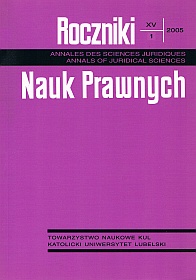Imputability as the Subjective Element of Crime
Abstract
Imputability as the subjective element of crime denotes, first of all, that we can impute a certain act to a person as its author. In the Church there is a close relationship between criminal and moral responsibility, therefore he or she can be considered responsible for such behaviour that is at the same time contradictory with a moral norm, i.e. it is a grave sin, manifested and causing harm.
There must be a more profound causative relationship between an illegal act and its agent – this act must be completely his or her own, he or she must be morally imputable. For someone to be considered imputable, his or her act must bear the signs of human action – actus vere humanus. The agent will bear this attribute when he or she is aware of it and the action results from his or her free will.
In CIC of 1917 the church lawgiver pointed out that for a crime to come about the criminal law must be violated by a person morally imputable, that is, morally culpable (moraliter imputabilis legis vel praecepti violatio). Now in the CIC of 1983 the lawgiver resolves that an external act is socially harmful only when it can be submitted to punishment and is the agent is gravely imputable (sit graviter imputabilis) and culpable.
The principle in can. 2199 CIC of 1917 pointed to two sources of imputability: dolus et culpa. The definition of deliberate guilt is contained both in the old and the new Codes of Canon Law. In the sources of the ancient law deliberate guilt was defined in different ways. It was often denoted by the terms propositum, deliberatis consultum scentia, malitia, fraus. The second source of criminal imputability was an inadvertent guilt (culpa). It is a just ignorance of the law that has been violated (ignorantia legis violatae), or omission of due diligence (omissio debitae deligentiae). Error or inattention are identified with ignorance.
The basic principle of criminal responsibility, as contained in the CIC of 1983, is the rule that all crimes committed with deliberation are submitted to this responsibility. Inadvertent crimes are punished only when their criminality is clearly marked in the law or criminal order. One may therefore notice an essential difference between the regulation of this issue in the old and the new Code. Moreover, in can. 2200 par. 2 CIC of 1917 presumption of deliberate guilt was assumed, a fact that was in line with the ancient canonical tradition. In can. 1321 par. 3 of the new CIC we find only presumption of imputability.
References
Bączkowicz F., Baron J., Stawinoga W.: Prawo kanoniczne. Podręcznik dla duchowieństwa, t. 3, Opole 1958.
Calabrese A.: Diritto penale canonico, Alba 1990.
De Paolis V., CitoD.: Le sanzioni nella Chiesa. Commento al Codice di Diritto Canonico Libro VI, Roma 2000.
D'Auria A.: Delitto e imputabilità nell'ordinamento penale canonico, [w:] Z. Suchecki (red.), Il processo penale canonico, Roma 2003, s. 111-114.
Krukowski J., Lempa F.: Księga VI: Sankcje w Kościele, [w:] W. Wójcik, J. Krukowski, F. Lempa, Komentarz do Kodeksu Prawa Kanonicznego, t. 4, Lublin 1987.
Krukowski J.: Nowe prawo karne Kościoła Łacińskiego, „Ateneum Kapłańskie”, 102(1984.
Lega M.: De delictis et poenis, Romae 1910.
Michiels G.: De delictis et de poenis. Commentarius Libri V Codicis Iuris Canonici, vol. 1: De delictis. Canones 2195-2213, Lublin−Brasschaat 1934.
Miziński A. G.: Elementy kanonicznego procesu karno-administracyjnego, „Roczniki Nauk Prawnych”, 13(2003), nr 2.
Myrcha M. A.: Nieświadomość bezprawności a wina w karnym ustawodawstwie kanonicznym i polskim, „Polonia Sacra”, 7(1955), nr 1.
Myrcha M. A.: Problem grzechu w karnym ustawodawstwie kanonicznym, PK 29(1986), nr 1-2.
Myrcha M. A.: Problem winy w karnym ustawodawstwie kanonicznym, PK 8(1965), nr 2, s. 3-32; PK 8(1965), nr 3-4, s 79-104; PK 14(1971), nr 3-4, s. 69-148; PK 15(1972), nr 1-2, s. 73-118; PK 15(1972), nr 3-4, s. 135-193; PK 16(1972), nr 3-4, s. 205-275; PK 16(1973), nr 3-4, s. 321-395; PK 17(1974), nr 3-4.
Palazzini P.: Imputabilitas, [w:] Dictionarium morale et canonicum, t. 2, Romae 1965, s. 653.
Pawluk T.: Prawo kanoniczne według Kodeksu Jana Pawła II, t.4: Dobra doczesne Kościoła, Sankcje w Kościele, Procesy, Olsztyn 1990.
Syryjczyk J.: Niektóre gwarancje sprawiedliwego wymiaru kar w Kodeksie Prawa Kanonicznego z 1983 r., PK 34(1991), nr 3-4, s. 155.
Syryjczyk J.: Pojęcie przestępstwa w świetle Kodeksu Prawa Kanonicznego Jana Pawła II, PK 28(1985), nr 1-2, s. 90-91.
Sztafrowski E.: Podręcznik Prawa Kanonicznego, t. 4, Warszawa 1986.
Urru A. G.: Punire per salvare. Il sistema penale nella Chiesa, Roma 2001.
Wernz F. X.: Ius decretalium. Ius poenale Ecclesiae Catholice, t. 6, Prati 1913.
Copyright (c) 2005 Roczniki Nauk Prawnych

This work is licensed under a Creative Commons Attribution-NonCommercial-NoDerivatives 4.0 International License.


